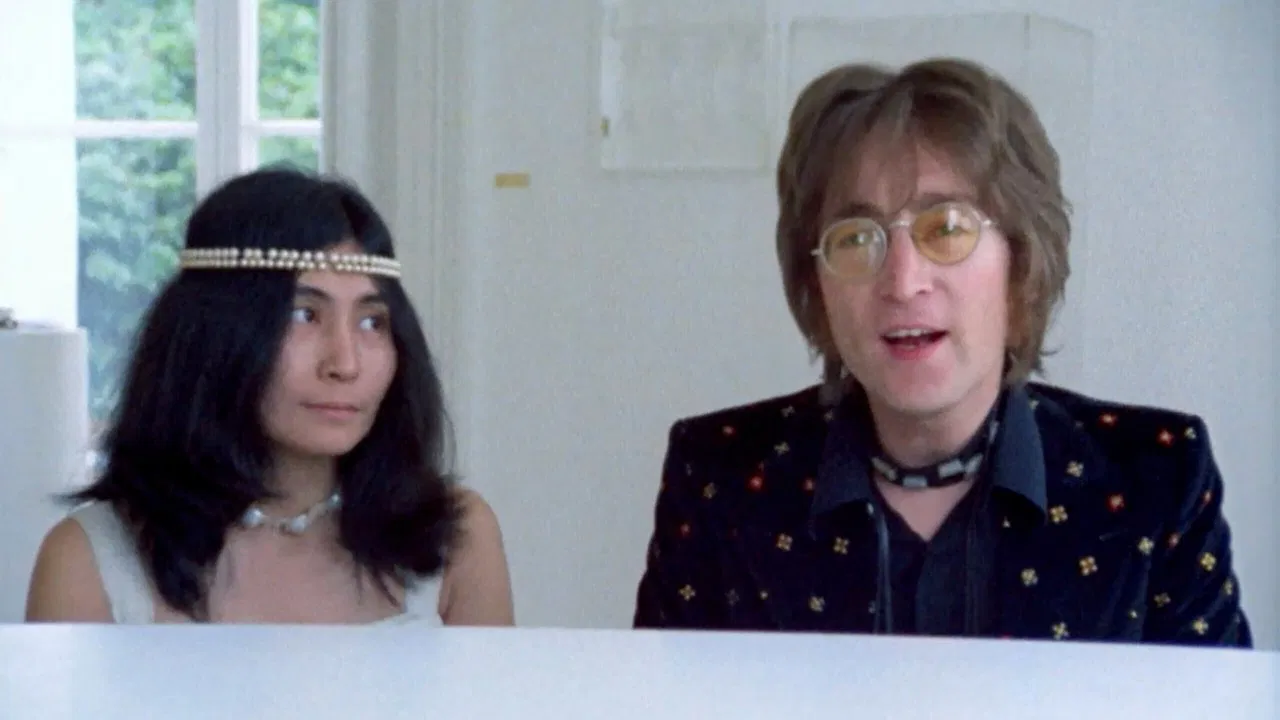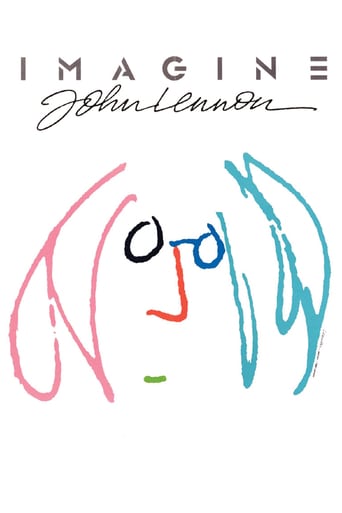

That was an excellent one.
... View MoreThe plot isn't so bad, but the pace of storytelling is too slow which makes people bored. Certain moments are so obvious and unnecessary for the main plot. I would've fast-forwarded those moments if it was an online streaming. The ending looks like implying a sequel, not sure if this movie will get one
... View MoreIt's a good bad... and worth a popcorn matinée. While it's easy to lament what could have been...
... View MoreThrough painfully honest and emotional moments, the movie becomes irresistibly relatable
... View MoreImagine: John Lennon is a documentary film about former Beatle and English musician John Lennon. Bridging his two musical phases together as a member of The Beatles and as a solo artist, it is a career-spanning collection of Lennon's many musical highlights. In addition, there are a couple of heretofore unreleased recordings: an acoustic demo of "Real Love" taped in 1979 and a rehearsal take of "Imagine" in mid-1971. The personal film archives of Yoko Ono were utilized,it obviously downplays Lennon's association with the Beatles and concentrates on his years with Ono and a solo artist. It spends a lot of time recounting Lennon's anti-war activities, highlighted by a confrontation on a talk show hosted by conservative cartoonist Al Capp.But nevertheless,it is a worthy chronicle and with its wealth of stock footage and self- narration,this proved to be a must-see for any Beatles or Lennon fan.
... View MoreIMAGINE: JOHN LENNON is a very personal and emotional scrapbook that takes us right into the mind and soul of the great artist who departed this world much to early. Largely comprised from hundreds of hours of Lennon interviews and personal home movies, this feature is narrated in John's own words, giving us a bird's eye view of his life and experiences before, during, and after The Beatles. It's a candid and close look at Lennon the musician, the husband, the father and, most significantly of all, the Man.The documentary begins in 1971 at Tittenhurst Park in England, where John and Yoko lived and were then working on John's great IMAGINE album in a studio adjoining their home. Through John's own memories we then go backward in time to his birth, his rise to fame with the Beatles, the breakup of the group, his key meeting with Yoko Ono, all the exploits of John and Yoko through the late sixties and seventies, Lennon's retirement to raise his son Sean in 1975, and ultimately his happy comeback into the limelight in late 1980, when he was tragically assassinated and the entire world came to a screeching hault for millions.For rabid Lennon fans there are very juicy segments included, such as John recording "How Do You Sleep" (his infamous swipe at Paul McCartney) with the assistance of George Harrison on slide guitar. We see the very candid and human sides of John from inside the glass of the recording studio as he swears at an engineer for not being able to send forward the proper pre-recorded verse of "Oh Yoko" so that Lennon can add his backing harmonies to it. A real treat is a lengthy segment from the 1969 "Bed-In" period where we get to see a visibly perturbed Lennon trying to maintain his peaceful stance while sparring with ultra-conservative artist Al Capp while the man continually attacks and insults John and Yoko right to their faces. Another key bit of business features Lennon storming into a newspaper office to confront a journalist who's just written a seething article denouncing the Lennons. A real gem of a clip concerns a scruffy hippie who's camped out at Lennon's garden overnight and tried to meet the famous ex-Beatle. With the cameras capturing their confrontation, John tries to explain to the far-out young man that he's just a regular guy who writes songs, some of which don't really mean anything special, and that he's only human. After this, John invites the hungry man into his home to give him breakfast.John Lennon's appeal to the true fan was that he was very honest about who he was and what he believed in, and we could always relate to him and feel he was as real a person as we were. This film manages to capture the essence of John and it's a job very well done by director Andrew Solt, who had to plow through hundreds of hours of material, most of which must have been indispensable, to try and form a definitive representation of Lennon's whole life. If there is a tiny flaw in the film at all, it may be because John's life was so extraordinary that it's virtually impossible to get it all together in such a short space of running time; there is a sense of everything being squeezed together rather quickly (especially the Beatle years), where several hours would probably have been more adequate!Yoko Ono has gotten such a bad rap over the decades, and that's a real shame, as it's so obvious through her own observations and actual on-film reactions here that she was as in love with John and as respectful of him as he was toward her. It should be understood and accepted that John wanted to be with Yoko and that she "saved him from a kind of death" (as he once said). It may be difficult for some to accept that Lennon drifted away from the idea of being "one of the boys" with the Beatles and getting married and devoting his life to his relationship with Yoko, but it's what made him feel happy and fulfilled. As John himself said in one of his very final interviews for PLAYBOY in 1980:LENNON: "Listen, if somebody's gonna impress me, whether it be a Maharishi or a Janov or a Yoko, there comes a point when the emperor has no clothes. Because I do stupid things, I've done stupid things. I am naive but I'm also not stupid. So there comes a point where I will see. And nobody can pull the wool that long. So for all you folks out there who think that I'm having the wool pulled over my eyes, well, that's an insult to me. Not that you think less of Yoko, because that's your problem; what I think of her is what counts! But if you think you know me or you have some part of me because of the music I've made, and then you think I'm being controlled like a dog on a leash because I do things with her, then screw you, brother or sister... you don't know what's happening. I'm not here for you. I'm here for me and her and now the baby. Anybody who claims to have some interest in me as an individual artist or even as part of the Beatles has absolutely misunderstood everything I ever said if they can't see why I'm with Yoko." ***1/2 out of ****
... View MoreThe 1960's and 70's were a time of change uncertainty for our country. War waged on in Vietnam, the "hippie" era was in bloom, and there was of course the music. There was only one voice heard in all of these areas: John Lennon.Imagine: John Lennon is Andrew Solt's documentary about the rock legend John Lennon. It spans over 40 years from his early days in Liverpool and Hamburg to that fatal December night in New York City, 1980. It showcases his musical talent and outspokenness for peace, love, and music.The movie goes back and forth from John Lennon's home recording studio in 1973 to Lennon's life story. It's an interesting way of telling a man's life. The first half is mostly about the rise of The Beatles. Starting in Liverpool, bassist Paul McCartney, guitarist George Harrison, and drummer Ringo Starr create a sound that will rock the world. They go from playing small, rowdy venues in Liverpool and Hamburg, to the "big time".Their album "Meet the Beatles" is just the ticket they need to make it across the pond to the US. Beatlemania is reaching critical mass and Lennon was having difficulties controlling his personal life and his life on the road. His wife Cynthia and son Julian have to be second to the band. Cynthia won't stick around for long, she eventually asks him for a divorce.As The Beatles begin to experiment in drugs, there music too sounds a little experimental. Using many different sounds and beats, they will once again have a rock and roll revolution. Their album Sgt. Pepper's Lonely Heart's Club Band became one of their most famous. But all isn't "Strawberry Fields" in the studio. With Lennon's latest girl Yoko Ono, the band feels like she is impeding on their creativity. After more than 10 years together, The Beatles are no more.This was not the end for Lennon. Solt goes way beyond The Beatles in this movie. He shows us his private life with home videos and interviews with Yoko, Julian, his other son Sean, and close friends of the family.For fans of The Beatles and of Lennon, this movie is ideal. It's a great look into the life of the legendary singer/song writer. The music is fantastic and the movie itself is well put together. For those who have some interest in this subject, the movie may be slightly boring.The one thing you can't overlook is Lennon's impact on pop culture. He was the voice of a generation that wanted nothing more than to, "give peace a chance". It seems like everything he did had some meaning behind it. He wrote songs about his kids, about his father, and about Yoko. He also had many politically charged songs and some "choice" album covers.This documentary was cleverly done and well put together. Although it at times has some not so interesting information, for the most part it is a fantastic look into the life of a cultural icon.
... View MoreIf you like the Beatles, you'll like this movie........even if you don't necessarily like the Beatles, there's a good chance you'll still enjoy this piece of historical film that affected the way the world thought during the 60's and 70's...........Watch it........it's a very good film with rare footage and excellent commentaries.
... View More